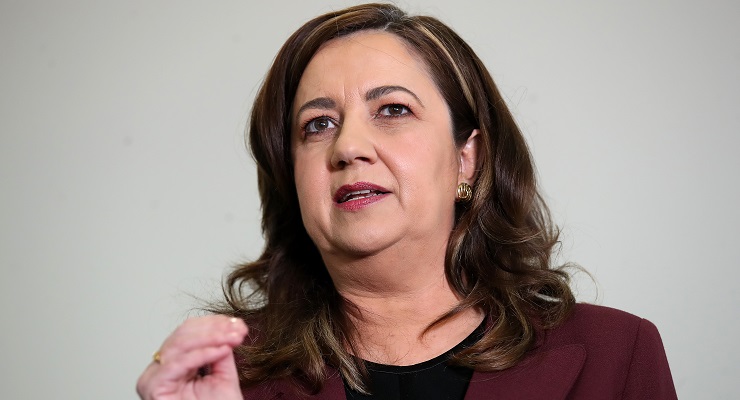
How do we define a lobbyist? Dictionaries have it as someone who tries to influence politicians in an organised way. But how it is policed in practice is a murky, dark art that leaves voters, almost always, clueless.
The Morrison government’s election campaign was coloured by accusations of pork-barrelling and the desperate need for a federal integrity body, which we will now get. And in Queensland, at least two inquiries — run by Tony Fitzgerald QC and Professor Peter Coaldrake — are raking over accusations that go to the heart of integrity and accountability in government.
We should be able to trust our governments to act fairly, transparently and in our interests. But history has proved that belief wrong — and that’s why the role of a lobbyist is so central to discussions around integrity and accountability.
A short recap for those outside the Sunshine State: outgoing state integrity commissioner Dr Nikola Stepanov and former state archivist Mike Summerell have both made serious allegations that go to the heart of good government — from a computer being taken and wiped, to reports being falsified and sanitised to make the government look good.
Perhaps in an attempt to mute the daily list of alleged integrity breaches, the government initiated the Fitzgerald and Coaldrake inquiries. The terms of reference for both are narrow, but many hope the path they recommend provides more rigour for the independent bodies that build trust in elected government.
That’s where the role of lobbyist comes in. In an interim report, Coaldrake signalled that the state’s lobbyist register simply does not work.
“Unfortunately there is declining confidence that governments across the board are making the best decisions rather than decisions influenced by those with the most effective voice,” he wrote. “In Queensland recently, this has been accentuated by the dual roles of some lobbyists — acting for clients to influence government, then acting for political parties to help them win elections.”
That no doubt refers to a decision by Queensland Labor to hire two party powerbrokers who have become lobbyists — Evan Moorhead and Cameron Milner — to help run the Palaszczuk government’s last reelection campaign.
“This can leave the public sceptical about even the strongest protections against conflict,” Coaldrake said. “The same applies to the practice of professional firms lobbying governments on behalf of clients while acting through a different arm as consultants on policy.”
And then there are “in-house lobbyists”. Why should they be excluded from a lobbyist register? They shouldn’t be.
But what about other shortcuts that have been employed to ensure lobbying for government favour can go on around the rules? Companies dealing with senior ministerial officers, not a minister. Lobbyists having an “unofficial” meeting with a minister outside the office. Consultants meeting with a minister for “clarification” over an issue.
Or “consultants” working for big companies doing business with government — like Star Entertainment. (This week revelations have surfaced that Moorhead is also employed by Star as a consultant on how to do business with the Palaszczuk government — until today, that connection being made public resisted an external investigation into the gambling giant despite serious problems being found elsewhere.)
What about senior government employees quitting and opening consultancies in their expert area a week later? In private industry it’s called taking “gardening leave”, and it is there for good reason.
What about a private Friday night dinner attended by donors and ministers? Should that be included in a lobbyist register?
A lobbyist register is useless unless it acts as a catchment for influence being peddled by anyone outside government. But perhaps what’s more worrying here is that elected governments don’t see the need to be seen to be doing the right thing.
Prime Minister Anthony Albanese has a chance to change that with the powers he approves for his Commonwealth integrity body. He needs to ensure the obfuscation around pork-barrelling does not happen on his watch. And Annastacia Palaszczuk needs to look in the mirror and ask why the integrity of her government is regularly being questioned — and what might put a stop to that.
Culture starts at the top.








How recent is this here, “new fangled lobbyist lurk” – just now drawing King’s attention?
Another golden oldie … Billie Field-ish?
…. Oh for the good ol’ daze of Bjelke-Petersen – as was the tune played back in the old daze working for the Curry or Maul under husband Dave Fagan, pumping out pro-Coalition/anti-Labor propaganda?
Or the halcyon daze of one-term Limited News Party wonder boy Campbell Newman – with his anti-bikie laws and slipping judicial cheer-leader of those laws, Tim Carmody, into the Qld Chief Justice slot – to the chorus of approval and defence, from the editorial messengers at the same Limited News’ Curry or Maul.
While slagging off Tony Fitzgerald – when he was criticising such policy implementation.
…. But of course that was different – that was Limited News Party corruption, so that was invisible to the naked biased hack’s eye…. Not worth writing about.
Ultimately a lobbyist register is an empty token. It reveals only that a lobbyist has spoken to a minister. That the conversation will be about something that will benefit the lobbyist’s client can be taken as read. But it tells us nothing about what was said or any commitments that may have been made. The only hope for greater accountability lies in requiring the publication of reasons for every major decision including details of who will benefit from it financially. The dubious screen of ‘commercial in confidence’ should be torn down and light shone on the use of taxpayers’ money. If corporations and individuals want to do business with government, it should be a price they have to pay.
After ten years of living outside Australia I returned to Canberra in late 2016 (last thing I learned before boarding that last flight home was that Trump had won the US election.)
In early 2017 Game of Mates: how favours bleed the nation by Cameron Murray and Paul Frijters was published. The stories were so appalling that I could read only a few pages at a time.
I am amazed that so many people still do not recognise that lobbyists are those who manage to remain upright and not giddy while in the revolving door that allows them to amass huge personal and private benefits at public cost. We expect these people to change the system? Ya dreaming’!
There is no evidence that organised lobbying is good for society. However, the flys will always gather around the nest that creates policy and law. I propose that ministers be prohibited from meeting with any person who does not have authority from a social, industrial, aggregated commercial organisation or individual citizen;ie no self interest unless it directly pertains to you human self, the only kind of ‘self’ that can vote.
Everyone should have equal access to government. No-one should be allowed to gain access by paying huge fees at dinners or making so-called donations. Nor should politicians be allowed to become lobbyists and vice versa – the revolving door. This makes a mockery of democracy and shows we still have a long way to go to be a democratic nation. To me it is simply bribery and unethical to allow lobbyist procedures.